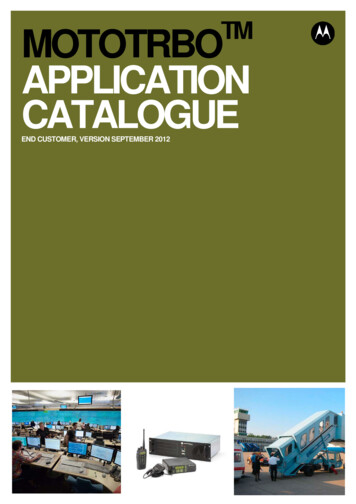
Transcription
What about Italy?Easy guide to your Italian businesswww.pwc-tls.it
1Start-up business - Incorporationof an Italian entity1.1In order to carry out a business activity in Italy is it necessaryto incorporate a company or is it possible to act by means of a branch?p. 3.1.10 Which are the obligations and procedures for the incorporationof a corporate entity?p. 7.1.2 What business activities may be carried out in Italywhich are not subject to Italian taxation on income?p. 3.1.11 May a company be set up by a sole shareholder/quotaholder?p. 8.1.3 Is there a definition of “permanent establishment”in the Italian Law?p. 4.1.4 Individuals have been transferred to Italy to set up the business;how are they considered for income tax and social security purposes?p. 4.1.5 Has Italy signed any Treaties to avoid double taxation?p. 5.1.6 And what about Social Security Agreements?p. 6.1.7 Starting a commercial activity in Italy: what are the main taxconsequences of operating through a corporation or a branch?p. 6.1.12 May specific assets be dedicated to financing a specific business?p. 9.1.13 Are contributions in kind permitted?p. 10.1.14 Is the full amount of corporate capital required to be paidin at the time of incorporation?p. 10.1.15 Is it possible for shareholders to provide accessory services (prestazioniaccessorie) to the company?p. 10.1.16 Is it possible to issue different kinds of shares?p. 11.1.17 May quotas with different corporate rights be provided?p. 11.1.8 Is it possible to move from a branch structure to a corporate structure?And viceversa?p. 6.1.18 Are there any differences, under a tax standpoint, between the varioustypes of companies in Italy?p. 11.1.9 Which type of corporate entities can be set up in Italy?p. 7.1.19 Which are the main taxes for the incorporation of a company in Italy?p. 11.
1.11.2In order to carry out a business activity in Italy is it necessaryto incorporate a company or is it possible to act by means of abranch?What business activities may be carried out in Italy which are notsubject to Italian taxation on income?It is possible to start a business activity in Italy through (i) the incorporation of acompany, or (ii) the opening of a branch.In general terms, a foreign company will not be deemed to have a “permanentestablishment” in Italy, and therefore will not be subject to taxation in Italy, if itcarries out solely a preparatory or auxiliary activity, even if this activity is carriedout in a fixed place of business (premises and/or personnel).Under the Italian Civil Code, a company is an independent entity with respect to theforeign company.It may have limited liability or it may be a partnership. In the first case, the liabilityof the stockholders is limited to the amount of the participation subscribed by eachof them while partnerships do not have a limited liability status and the partners areliable for all the debts and obligations of the company.Under a legal and a statutory point of view, the incorporation and managementof a limited liability company implies greater fulfilment and fixed costs than thoseimposed for a branch such as, for example, the approval and yearly registrationof the statutory financial statements, the obligation to keep statutory books, theappointment of the statutory auditors in the event that certain thresholds areexceeded, etc.In order to perform a business activity in Italy, foreign companies may establish abranch, according to the Italian Civil Code.Under a legal point of view, a branch is not a separate legal entity with respect to theparent company and its establishment in Italy must be registered with the Registerof Companies. A branch is subject to less statutory fulfilment with respect to acompany’s requirements.From a tax point of view, a branch is deemed a permanent establishment of theforeign company and it is mainly treated as an independent entity for tax purposes.In general, a branch is subject to the same tax treatment of an Italian company asit is subject to corporate taxes for the profits produced in Italy (for this purpose,the branch must draw up yearly financial balance sheet). Furthermore, a branchis subject to the same tax fulfilment as Italian companies such as, for example, thekeeping of official registers and the obligation to file corporate taxes returns as wellas VAT returns.What about Italy? Easy guide to your Italian businessIn particular, a fixed place of business cannot be deemed to be a permanentestablishment of a company resident abroad, if the following activities are carriedout:i. the use of an installation solely for the purpose of storage, display or delivery ofgoods or merchandise belonging to the company;ii. the maintenance of a stock of goods or merchandise belonging to thecompany solely for the purpose of storage, display or delivery;iii. the maintenance of a stock of goods or merchandise belonging to the companysolely for the purpose of processing by another company;iv. the maintenance of a fixed place of business solely for the purpose of purchasinggoods or merchandise or collecting information for the company;v. the maintenance of a fixed place of business solely in order to carry out anyother type of preparatory or auxiliary activity on behalf of the company;vi. the maintenance of a fixed place of business solely for any combination of theactivities mentioned above provided that the overall activity resulting from thiscombination is of a preparatory or auxiliary character.For further details on the above stated points, reference should be made the ItalianIncome Tax Code (TUIR - Testo Unico delle Imposte sui Redditi, PresidentialDecree No. 917 of December 22, 1986) with regards to the rules concerning the“permanent establishment”, introduced in 2004.Non-resident companies may enter into a preliminary ruling procedure withthe Italian Tax Authorities with the aim to ascertain whether the activities to beperformed in Italy give rise to a permanent establishment.www.pwc-tls.it 3
1.31.4Is there a definition of “permanent establishment” in the ItalianLaw?The definition of “permanent establishment” is stated in art. 162 of the ItalianIncome Tax Code under two different descriptions:a. “fixed place of business” (at the disposal of the Principal) through which thebusiness of the foreign entity is wholly or partly carried on in Italy – “material PE”;b. “dependent agent” that is acting on behalf of the foreign entity and has, andhabitually exercises, in Italy an authority to conclude contracts in the name ofthe foreign entity “agency PE”.In general, the “material PE” is described as a fixed place of business by means ofwhich the non-resident company carries out all or part of its business activitieswithin the territory of Italy”.In particular, the “material PE” comprises:i. a place of management;ii. a branch;iii. an office;iv. a factory;v. a workshop;vi. a mine, an oil or gas well, a quarry or any other place of extraction of naturalresources;vii. a building site or construction or installation project constitutes a permanentestablishment only if it exists for more than three months.Instead, the so called “agency PE” is described as a“dependent agent”, in otherwords any party having a dependent status that concludes contracts other thancontracts for the purchase of goods in the name of the non resident company.For income tax purposesAssuming that the presence and the activity of the transferred individual do notcreate any permanent establishment issue in Italy, the individual is liable to Italianincome taxes on the basis of his/her “tax residency status” to be determined inaccordance with Section 2 of the Italian Income Tax Code.An individual is considered “resident” for tax purposes if, for the greater part of thefiscal year (i.e.: at least 183 days): is registered with the Registry of the Italian Resident Population (“Anagrafe”); or has his/her “domicile” in the territory of the Italian State, as defined by Section43 of the Italian Civil Code (the place where the individual as his/her economic,social and family center of interests); has his/her “residence” in the territory of the Italian State, as defined by Section43 of the Italian Civil Code (the place where the individual has declared theirhabitual abode).Taxation of resident individuals:Resident individuals are subject to the Italian personal (or national) income taxeson their income wherever produced (under the so called ‘worldwide principle’).Therefore, residents are also subject to taxation on income deriving from real estateowned outside of the Italian territory, foreign dividends and interests, foreigncompensations and director’s fees and other types of foreign income.In addition to the personal income tax, Italian legislation, as of fiscal year 2012,has introduced for individuals resident in Italy a ‘wealth tax’ on investments whichare located outside of the Italian territory (called “IVAFE” for financial investmentsowned outside of Italy and “IVIE” for real estate investments).For an agency PE, the following conditions must exist: the entity/person must be a “dependent agent”; the entity/person must habitually conclude contracts on behalf of the nonresident company; the contracts concluded must not be contracts for the purchase of goods.Taxation of non-residents:It is worth pointing out that the definition of permanent establishment set in the taxtreaties prevails over the domestic definition, in all such cases whereby a tax treatyapplies.What about Italy? Easy guide to your Italian businessIndividuals have been transferred to Italy to set up the business;how are they considered for income tax and social securitypurposes?Individuals who are non-residents are subject to PIT (IRPEF) only on income arisingfrom Italian sources (i.e. income earned in Italy).Therefore, foreign income is not relevant for the purposes of taxation in Italy; thisapplies to both income and wealth tax.www.pwc-tls.it 4
1.5For social security purposesHas Italy signed any Treaties to avoid double taxation?According to the Italian employment law a foreign individual working in the Italianterritory (i.e.: even if the employer is located outside of Italy):Italy has signed over 90 Treaties to avoid double taxation. The majority of theTreaties are based on the OECD model which has the following structure: is subject to the same rights and duties of an Italian worker also in terms of socialsecurity coverage; is liable to Italian social security contributions during the period of his/her workstay in Italy.Article 1 - Persons coveredArticle 2 - Taxes coveredArticle 3 - General definitionsArticle 4 - ResidentArticle 5 - Permanent establishmentArticle 6 - Income from immovablepropertyArticle 7 - Business profitsArticle 8 - Shipping, inland waterwaystransport and air transportArticle 9 - Associated enterprisesArticle 10 - DividendsArticle 11 - InterestArticle 12 - RoyaltiesArticle 13 - Capital gainsArticle 14 - Independent personal services(this article has been deletedfrom the OECD model butis still present in differentDouble Tax Treaties)The Italian social security contributions are provided by both the employee and theemployer, while the settlement can only be carried out by the latter.An exception to the above rule may be provided by the Social Security Agreementsbetween Italy and the Country of origin (see also § 1.6).Article 15 - Income from employmentArticle 16 - Directors’ feesArticle 17 - Artists and sportsmenArticle 18 - PensionsArticle 19 - Government serviceArticle 20 - StudentsArticle 21 - Other incomeArtic
Easy guide to your Italian business www.pwc-tls.it 3 In order to carry out a business activity in Italy is it necessary to incorporate a company or is it possible to act by means of a branch? It is possible to start a business activity in Italy through (i) the incorporation of a company, or (ii) the opening of a branch. Under the Italian Civil Code, a company is an independent entity with .

![The GIANO-TNG spectrometer [6269-46]](/img/1/spie-6269-46.jpg)








